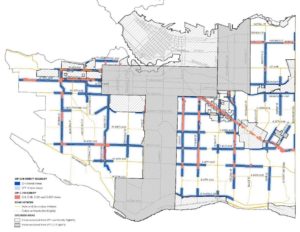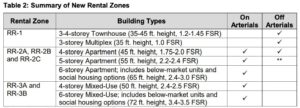
The graphic above courtesy of retired Vancouver architect, Brian Palmquist. “All the blue and orange areas up for grabs” in a mass rezoning of 16 of 22 Vancouver neighbourhoods.
Has there ever been a Vancouver City Council more seemingly in the pocket of developers than our current Vancouver City Council?
Oh sure, our Mayor and Councillors do the right thing on occasion — as they did last week in referring the redevelopment of False Creek South to the city’s Planning Department — but, objectively and overall, the commitment to “growth” in our city continues unabated, as it did in the decade Vision Vancouver was in power at City Hall, and as continues on through until this day.
Densification of our city is an inevitability, as more and more people move to our little burgh by the sea. The question arises, though: in whose interests, and to whose benefit will this densification of our city take place?
Where is the clarion commitment to non-market co-operative and co-housing, and supportive social housing that will house the broad swath of Vancouver residents who earn the median income of $44,000 for single persons, and $65,000 for couples (figures provided by Statistics Canada), seniors on fixed incomes, single parents of little means, the creative community, and persons living at the shelter rate?
A corollary to those questions is the question posed by UBC professor Patrick Condon In his latest article in The Tyee …
“The presumption is that by increasing rental stock all along the shown routes rents will drop to affordable rates. But will they?”
Today, VanRamblings will present two informed perspectives on a document titled Streamlining Rental Around Local Shopping Areas , the massive 348-page report provided by city staff to Vancouver’s bealeaguered City Councillors for action.
Click on this link to listen to Patrick Condon’s interview on The Early Edition.
In his column in The Tyee, Dr. Condon writes …
“The importance of this motion cannot be overemphasized. In effect this proposed bylaw change, in combination with the Broadway plan, probably predetermines the density, tenure and affordability of most of the city. If this is true, what then is left for the city to decide in its ongoing $18 million city-wide plan, three years in the making?
Providing affordable housing is the existential need in our city. Our service workers, many of who are our sons and daughters, are being forced out of this city in droves. This Trojan Horse of a seemingly technical change will, if passed, benefit mainly the land speculator, whose pockets are already stuffed to overflowing.
Our housing crisis and accompanying urban land value inflation is far worse than experienced by either Cambridge or Berkeley. We should do no less than what they have enacted, and find a way to stream land value gains into affordable homes for those who need them.
The crux of the matter is this: the mass rezoning of Vancouver, if passed by Vancouver City Council, will “allow for six-storey mixed-use, unaffordable market rental buildings development” in residential neighbourhoods across the city.
Not to mention which, should Council approve the staff report, there would be NO community consultation and no option for residents to address Council on future rental projects approved by staff for construction in their neighbourhood.

In the report currently before Vancouver City Council, our elected representatives not only have to digest all 348 densely-packed pages of the report, and make some sense of the lengthy document and what it portends for the city going forward, but vote on the most significant change to zoning — a mass rezoning of 16 of our city’s 22 neighbourhoods, sans much in the way of any palpable, informed input from residents now, or more particularly, in the future — Vancouver has ever witnessed.
Take a look at the graphic above. The city’s Planning Department envisions, and recommends to the members of Vancouver City Council, the approval of three to six storey apartment-style buildings along arterials in 16 of Vancouver’s 22 neighbourhoods — as well as, three and four storey townhouses and apartment buildings along residential streets one block away from the arterials.
All in the name of what? Greed? A “gentle densification” of our city that will make living in Vancouver more affordable for families — is that the goal of The Plan?
In his substack article titled Rental—Streamlining or Steamrolling? , architect Brian Palmquist writes …
More than a generation ago, anything more than single family homes in the RS districts of the city, which are much of this report’s focus, was forbidden. Basement suites were illegal and their closure was vigorously enforced by city staff — laneway houses as we now know them were nonexistent.
Fast forward to this report, where the same staff who impose burden after burden on even the simplest laneway rental home are proposing that RS homeowners solve the affordable housing shortage largely caused by staff’s work pace and fee demands, by accepting a massive up zoning affecting 16 of Vancouver’s 22 neighbourhoods — the other 6 are already subject to special, as-yet not revealed zoning such as the Broadway Plan and the Vancouver Plan.
Speakers presenting to Council may talk about various of the negative impacts of these proposals as they sit before you. As for me, I consider the proposal before you to be not so much streamlining as steamrolling.
VanRamblings presents the columns written by Patrick Condon and Brian Palmquist as edification on the Streamlining Rental Around Local Shopping Areas report before Vancouver City Council, and currently up for debate.
The key questions: Vancouver. A city for whom? Benefiting whose interests?
[Disclaimer. VanRamblings acknowledges that the members of Vancouver City Council are hard-working, dedicated public servants, who mean well for our city, and approach the very difficult work in which they engage each day with principle and integrity. VanRamblings’ rhetoric is meant only as a ‘shot across the bow’, a reminder to our elected representatives that it is us who they were elected to represent, not the special interests who whisper, almost constantly, into their ears.]